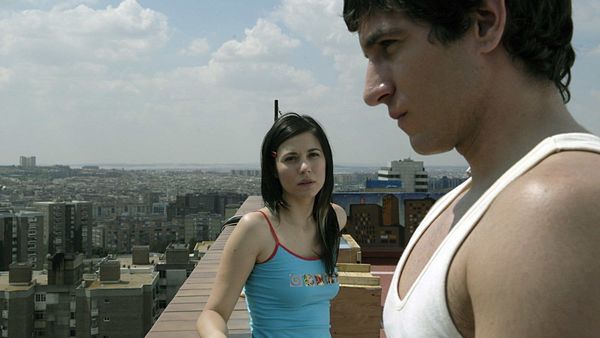Eye For Film >> Movies >> Dark Blue Almost Black (2006) Film Review
Dark Blue Almost Black
Reviewed by: Amber Wilkinson

Ensemble dramas are tricky to pull off. Often the weight falls too fully on one character for the other voices to be heard or the plotlines spin out of control. Writer/director Daniel Sánchez Arévalo keeps a steady hand on the tiller and pulls off a finely-tuned debut feature.
That he is so clearly in control, is interesting, since it is this very issue that lies at the heart of the film. Jorge is growing up fast and trying to spread his wings, desperate to make more of his life than his father Andres (Héctor Colomé) – a janitor – has achieved. The film opens with an act of rebellion that, for the unfortunate Jorge, leaves him unable to take proper control of his life.

Two years on and he is the janitor he never wanted to be, looking after his dementia-struck dad in his spare time. He dreams of a career in business and of a controlling stake in a will we/won’t we relationship with the (much more upwardly mobile) girl next door Natalia (Eva Pallarés). He spends most of his spare time lost in the machinations of sending out CVs or up on the rooftop discussing the inconsequential things in life with best buddy Israel (Raúl Arévalo) – who has a whole set of family problems of his own.
The flipside of the story concerns Jorge’s brother Antonio (Antonio de la Torre) – a con, who meets the girl of his dreams, Paula (Marta Etura) at a prison workshop. They fall in lust and are quickly to be found getting it on in the interests of getting Paula pregnant, which leads to unexpected consequences for Antonio and his hapless brother.
The plotline sounds as though it is on the fast-track to farce, but Arévalo keeps a tight rein on things, placing the weight on character over a quick laugh every time. Each of the players feels fully fleshed-out and despite dealing with traditional coming-of-age sexuality concerns, Arévalo avoids cliché. The plotline’s complexity is matched by the depth of the issues explored, with the cast uniformly coming up trumps.
Arévalo has a flare for direction and carefully crafts scenes so that they echo one another throughout the film. There are repeated scenes, for example, of people on two sides of an object mirroring one another. Unlike many debut directors, however, he doesn’t let this directorial styling get the better of him and – as with everything else in the film – cleverly controls it so that it adds to the cohesiveness rather than becoming overwrought.
The film snagged a clutch of Goya awards and a host of other festival nominations and rightly so. Arévalo and the younger members of his up-and-coming cast are ones to watch.
Reviewed on: 18 Mar 2007

















